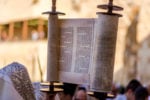
What is a Soul? III. The Many Souls of Man
…[H]e who tries to cure the soul, wishing to improve the moral qualities, must have a knowledge of the soul in its totality and

…[H]e who tries to cure the soul, wishing to improve the moral qualities, must have a knowledge of the soul in its totality and

In the biblical story of the creation of Adam, the Torah states: Then the Eternal G‑d formed man of the dust of the ground, and

Passover has ended. All Jews hastily return their Passover dishes to storage in special cabinets or the attic until the next Passover. After an eight-day